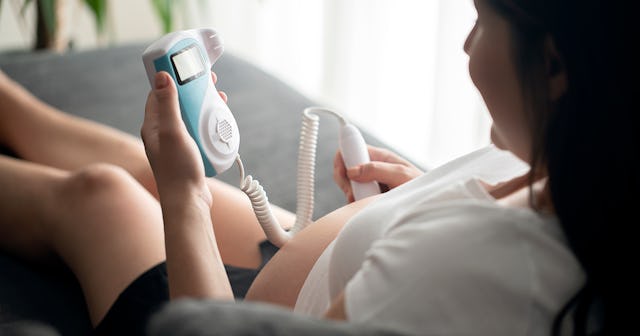Considering Getting A Fetal Heart Doppler Or Heart Rate Monitor? Read This First.

It makes sense why at-home fetal dopplers and baby heart rate monitors have become so popular in recent years. There’s nothing – nothing! – like hearing your baby’s heartbeat, especially for the first time. It can be overwhelmingly joyous and even a bit magical. “It’s real! There is a little jelly bean of a baby inside me!” But is it a baby gear essential or something you can do without?
With weeks in between doctor appointments, it also makes sense why some mommas-to-be would want to check on their baby’s heartbeat at home. Heartbeat dopplers can bring peace of mind and can also be a lovely way to connect with your baby in-utero. But turns out, they’re also a bit controversial. So should you add a fetal doppler or a wearable heart rate monitor to your Amazon registry alongside other must-haves like safe crib and a baby bouncer? Or should you stick to traditional nursery monitors and call it a night? We did the research for you and rounded up some products in order to help you decide.
What is a fetal heart doppler/baby heartbeat doppler?
So, what is a fetal doppler, exactly? The doppler is a hand-held ultrasound device that uses sound waves to listen to a fetal heartbeat, just like one your OB uses. Therefore, you’ll be able to hear your LO’s heartbeat in real-time. But keep in mind, an at-home baby doppler cannot replace your doctor’s expertise or top-of-the-line medical equipment. A doppler is meant to be used in between doctor visits, not instead of doctor visits. Got it?
Potential risks of using at-home fetal dopplers
Turns out, the FDA actually advises against using these devices. According to an article on the FDA website, Shahram Vaezy, Ph.D., an FDA biomedical engineer, states, “Although there is a lack of evidence of any harm due to ultrasound imaging and heartbeat monitors, prudent use of these devices by trained health care providers is important. Ultrasound can heat tissues slightly, and in some cases, it can also produce very small bubbles (cavitation) in some tissues.”
Dr. Jennifer Conti, Ob/Gyn and Modern Fertility Medical Advisor (Twitter: @doctorjenn), adds that fetal dopplers can cause more stress for parents than necessary. “I don’t recommend investing in a personal doppler because monitoring fetal heart rate is not as simple as just hearing the heartbeat,” she points out. “It’s a complex analysis we do every time we listen wherein we are checking for a certain number but also knowing how to respond to particular outliers depending on individual aspects of the pregnancy. I also find that dopplers can increase anxiety for people if, for example, they don’t hear a certain number or have trouble locating the heartbeat.”
If you’re still interested in using a heartbeat doppler at home, it’s best to consult with your doctor first – especially if you’re still in your first trimester, as most dopplers won’t yet pick up a heartbeat. No need to stir up unnecessary concern! Your OB can discuss the benefits and risks involved with dopplers, so be sure you’re on the same page as your doctor.
Baby heart rate monitors vs fetal heart dopplers
Fetal dopplers track heartbeat while Baby is in utero, but even after they’re born, you may want to continue tracking their heart rate and oxygen levels in those first few months. Many parents opt for high-tech, wearable monitors to make sure their LO’s vitals are normal, especially overnight. While there are absolutely no guarantees that these devices can prevent or lower the risk of SIDS, knowing that BB is healthy and safe helps some parents sleep more soundly — even if it’s only a few hours.
Since Baby is “on the outside” by the time you use a heart rate monitor, ultrasound technology is not needed to measure the heartbeat. Instead, light and/or movement sensors do the job. And to be clear, you won’t be able to hear the heartbeat, just track it. The information is often shared via Bluetooth to an app on your phone.
Pros + cons of using baby heartbeat monitors
For the record, these are also a little controversial, but it has more to do with user preference than anything else. While there is less of a safety concern with using a heart rate monitor on a baby as opposed to a fetal doppler on a fetus, some parents say that obsessive tracking and false alarms have added to their anxiety rather than reduced it. The monitors may also give moms and dads a false sense of security, and again, these monitors in no way claim that they can prevent or reduce the risk of SIDS. (Also, they don’t make it okay to give your infant a blanket or pillow.) On the flip side, however, you’ll hear stories from parents who swear that these monitors saved their baby’s life. So really, the decision to use one is completely up to you.
***
With all this said, if you’ve decided you still want a baby heart monitor for after your LO is born — we’ve gathered a couple of popular picks, according to reviews.
Best Baby Heart Rate & Oxygen Monitors
SHOP THE STORY
This article was originally published on